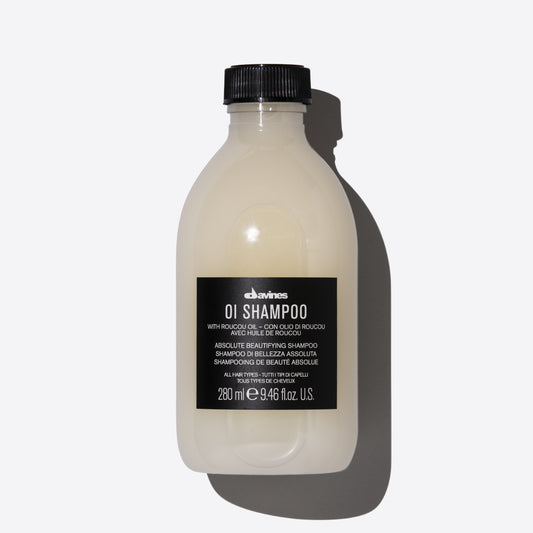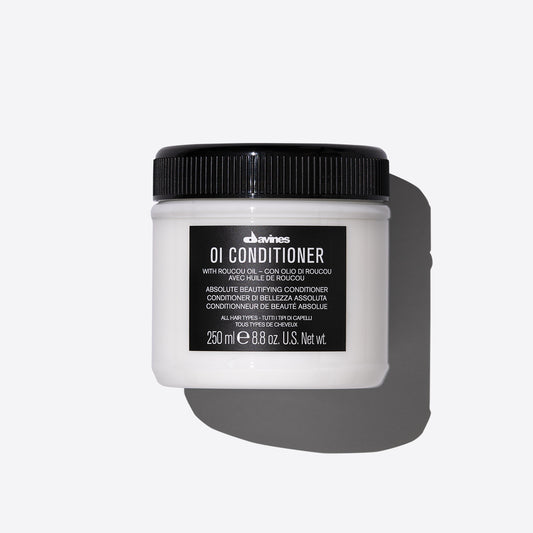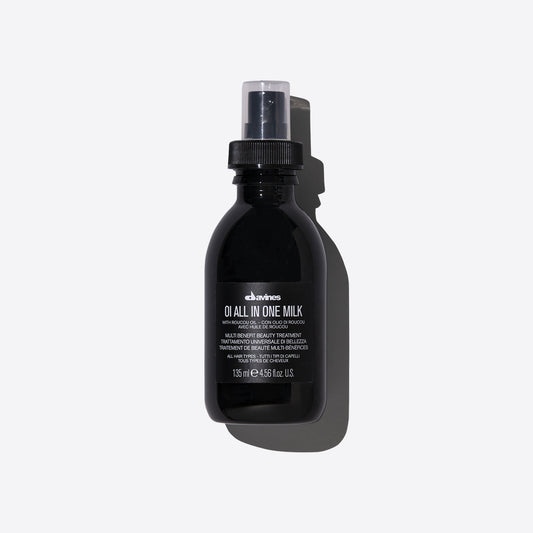In a world full of unique hair types, lengths and styles, finding the perfect maintenance and hair care routine for your locks can be a process of trial and error. While there are some straightforward solutions (like getting a stimulating shampoo for hair loss, a specialized leave-in for dandruff, or moisturizing products for dry scalp and fine hair), it's common to have different needs for your roots, lengths and ends. One hair type that needs this kind of targeted attention is the case of an oily scalp and dry ends.
How to know if you have an oily scalp and dry hair
You'll know you have an oily scalp if you're seeing excessive sebum within 1 or 2 days of washing, and brittle, damaged or split ends. Dealing with a combination hair type like this can be confusing — first, how to get rid of oily hair without stripping nourishment from your dry ends? And how do you ensure your ends are getting the rich product that might also make your oily roots even more flat and lifeless?
What causes oily scalp and dry ends?While we know that a big part of your hair type has to do with genetics, here are some common factors that can leave you with dry ends and an oily scalp.
- Bleaching or coloring
- Your hair type
- Excess sebum or build-up
- Overwashing
- Using the wrong hair products
- Weather
How to care for an oily scalp and dry ends
Now that you've established you have an oily scalp and dry ends, let's discuss the best way to care for this combination hair type to give you the best hair possible.
Change how you shampoo and condition
The best shampoos and conditioners will work with your specific needs. Even after picking the right hair products, your in-shower routine can have an effect on how oily your scalp is and dry your ends are. The main idea here is to concentrate the “treatment” of each part of your hair to that area only, as much as possible. So when you're massaging in your clarifying or dandruff shampoo, try to keep it concentrated to your scalp — this will fix greasy hair and help curb the effects of over-stripping your already dry ends of needed essential oils. And the same goes for your dry ends: when using a super nourishing or rich conditioner, that same formula that softens your ends might be too heavy on an already oily scalp.
Wash your hair less frequently
When dealing with an oily scalp, your first instinct might be to over-cleanse. But this often makes things worse: your scalp will generally end up amping up oil production more than before, in an effort to restore lost essential sebum and nutrients. Over-washing also has a negative effect on already dry ends and overall hair look, further stripping your strands of the oils they need to be shiny, soft and healthy. On average, it's suggested to wash your hair three or four times a week: more frequently if you have fine or thin hair (which tend to look limper faster due to build up) and less frequently the thicker or more textured and curly your hair is.
Use dry shampoo
Dry shampoo is an amazing resource to help extend the time between washes, which is also great news for dry ends. Using dry shampoo will allow you to absorb excess oil from the scalp, without needing to wash your hair, which can run the risk of over-stripping already dry ends. As a bonus, dry shampoo can also be a great pick-me-up for second or third-day hair: applying it to your roots often has a volumizing effect, giving you the extra movement and body that oily hair can be lacking.
Try a hair oil
Just how dry shampoo can provide targeted attention to an overly-oily cuticle and scalp, hair oil is one of the best hair products to take care of your dry ends. Avoiding the scalp (which would only make an oily situation worse) apply a few pumps of a nourishing hair oil through your lengths and ends. This will add needed moisture, as well as smooth down any frizz and flyaways that can result from dry and damaged hair.
Stop touching your hair
What might just seem like a harmless way to fidget might actually be making your oily scalp worse! Running your fingers through your hair isn't the issue, it's the oils naturally produced by your hands — the more you touch your hair, the more likely it is that these oils are transferred onto your hair and scalp.
Use less heat
Here's something you might not have considered when it comes to oily scalp care: when you use heat styling products, they can melt the oils in your hair. When heated they become more liquid and malleable, meaning it's easier for them to glide down your hair shaft spreading oiliness around. And on the other hand, frequent heat styling also won't be doing already dry hair any favors. Even with heat protectant products, repeated exposure to heat can make dryness and damage worse.
Try a hair oil
Just how dry shampoo can provide targeted attention to an overly-oily cuticle and scalp, hair oil is one of the best hair products to take care of your dry ends. Avoiding the scalp (which would only make an oily situation worse) apply a few pumps of a nourishing hair oil through your lengths and ends. This will add needed moisture, as well as smooth down any frizz and flyaways that can result from dry and damaged hair.
Use the right products
Finding the right hair care products are the first step to giving your hair and scalp the targeted attention that it needs. First, let's address the oil: a re-balancing shampoo will help reverse an excessively oily scalp (which can lead to further issues such as dandruff), helping to keep your scalp clean and clear without over-stripping it of essential moisture. To target your ends, a conditioner for dry hair or rich hair mask adds in needed nourishment, softness and shine.
While having a combination hair type means you have to take a little extra care to find the right products and routine to attend to your locks, it doesn't have to be complicated! Making simple adjustments such as finding a sulfate-free shampoo and conditioner, washing less frequently, using less heat and applying nourishing oils and dry shampoo on the scalp are all effective to help you care for an oily scalp and dry ends. Some at-home remedies like aloe vera are also effective, so try out different things to see what works best for you.



